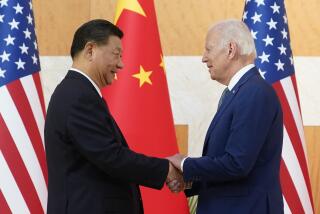A New Breed of Chinese ‘Peasant’ Will Glad-Hand Clinton
- Share via
XIAHE, China — In planning his upcoming trip to China, White House political strategists wanted some of the first images of President Clinton’s eight-day visit to come from a typical village representative of this country’s impressive economic progress over the past two decades.
“A villager should be found to introduce the president,” the internal, advance White House script for the visit prescribed in detail. “This person should have an interesting background and talk about his or her rising fortunes in the new China.”
The notion was that by beginning his voyage in Xian, the ancient western capital, and by finding a nearby village for a folksy encounter, Clinton could set a populist tone before encountering the Chinese political leadership in Beijing, still haunted by the ghosts of the deadly 1989 crackdown on pro-democracy protesters in Tiananmen Square.
The only problem with this scenario is that Xiahe, the Shaanxi province village chosen by the presidential advance team for this initial encounter Friday, the first full day of the presidential trip, is no more typical of China’s 1 million hamlets than Lourdes is of a French village or Carmel is of a California small town.
Xiahe, a prosperous village of 326 households 20 miles east of Xian, is essentially a tourism service community located just outside the walls of one of China’s greatest international attractions, the 2,000-year-old buried army of terra cotta warriors dating to the Emperor Qin Shi Huang.
Although a handful of farmers remain here, most of the 1,323 villagers work in the adjacent tourist attractions or manufacture souvenirs for the several million visitors who come each year to see the earthen warriors, discovered by local peasants digging a well in 1974.
“The discovery of the terra cotta warriors was a breakthrough for the economy of our village,” village Mayor Yang Yunlong, 43, explained in an interview.
The first warehouse-sized museum building housing the warriors was constructed in 1978. Tourists began flocking to the site in the early 1980s, and it became an essential stop for most visitors to China. Xiahe, on the southern flank of the museum grounds, has thrived on the spillover business.
“When I was a child, this was a very poor village,” said Yang, who is also a top-ranking Communist Party official here. “When I first became mayor here in 1982, the total village income was only 4 million yuan [then about $800,000]. In 1997, our village income was 62 million yuan [about $7.4 million now].”
Xiahe’s per capita annual income of about $5,500 places the village at a level nearly 10 times the national average for villages and is two to three times greater than the annual per capita income for China’s most prosperous coastal cities, including Shanghai.
The result of this booming tourist economy, bolstered by various nearby spinoff attractions and amusement parks--including a glass-and-cement replica of the Egyptian Sphinx and Pyramids--is instantly obvious to any experienced traveler to China.
Most villagers here live in large, two-story brick or tile homes with high-walled courtyards. A modern two-lane concrete street bisects the village, flanked on both sides by galvanized metal power and telephone poles. Automobiles and motor scooters abound here, although they remain a rare sight in most Chinese villages.
Xiahe does offer obvious security and transportation advantages for the presidential entourage. A major road, reserved primarily for visiting VIPs and senior Communist Party officials, leads directly from it to the private back entrance of the terra cotta warrior museum grounds. The president and first lady plan to visit the museum Friday afternoon before traveling to Beijing.
The village visit will include a round-table discussion with selected “peasants.” It will conclude with an appearance on the playground of the Xiahe Elementary School, marked on the White House script as “Remarks at School Yard.”
Xiahe’s relative affluence and broad experience with foreign visitors did not appear to diminish villagers’ enthusiasm this week for the impending visit by the leader of the world’s most powerful nation. Although he had some of the basic first family facts wrong (“I know that he and his very, very beautiful wife have three children”), Mayor Yang’s passion for the visit was so great that he even defended Clinton against what he considered to be unwarranted criticism in the press.
“As far as I am concerned,” ventured Yang, interviewed in the living room of his large home, “the media is sometimes wrong regarding President Clinton.”
Meanwhile, Xiahe homeowners busily raked and sprinkled their grounds and scrubbed the exterior walls of their homes in preparation for the visit.
This spiffing up, characterized by the mayor as “spring cleaning,” included the removal of graffiti, in one case a slogan extolling the virtues of family planning.
Uniformed schoolchildren under the instruction of Zhang Wenhui, 26, the village mathematics teacher, practiced the songs--mostly extolling the virtues of homework and study--that they plan to sing for the first couple.
Like most of the villagers, Wang Fanglan, 60, a widow, said she was excited by the prospect of the Clinton visit. But Wang, who embroiders cloth infant booties and children’s caps for sale to tourists, said she would not let the VIP delegation discourage her from making a profit.
Among the wares she was displaying on a village lane were boxes containing clay replicas of the warrior statues. Wang was offering the boxes for 50 yuan--the equivalent of about $6. But for the day of the Clinton visit, she said, she was considering raising the price to 100 yuan.
* JUDGING CLINTON IN CHINA: The president must choose substance over style on trip, Jim Mann says. A5
* VISA CONTROVERSY: Beijing defends its refusal of visas to three foreign journalists. A12
More to Read
Sign up for The Wild
We’ll help you find the best places to hike, bike and run, as well as the perfect silent spots for meditation and yoga.
You may occasionally receive promotional content from the Los Angeles Times.






